Live on the homepage now!
Reader Supported News
Members of the ex-president’s legal team have already begun brainstorming strategy and potential defenses, according to three people familiar with the matter and written communications reviewed by Rolling Stone. Trump himself has been briefed on potential legal defenses on at least two occasions this summer, two of the sources say.
That effort intensified after former Trump White House aide Cassidy Hutchinson’s June testimony before the House committee investigating Jan. 6.
“Members of the Trump legal team are quietly preparing, in the event charges are brought,” says one person familiar with the situation. “It would be career malpractice not to. Do the [former] president’s attorneys believe everything Cassidy said? No. … Do they think the Department of Justice would be wise to charge him? No. But we’ve gotten to a point where if you don’t think criminal charges are at least somewhat likely, you are not serving the [former] president’s best interests.”
The sources spoke on the condition of anonymity to discuss internal deliberations. Official Trump representatives did not respond to requests for comment on this story.
In their preparations, Trump’s team has discussed strategies that involve shifting blame from Trump to his advisers for the efforts to overturn the election, per the three sources, reflecting a broader push to find a fall guy — or fall guys. “Trump got some terrible advice from attorneys who, some people would argue, should have or must have known better,” says one of the sources with knowledge of recent discussions in Trumpland. “An ‘advice of counsel’ defense would be a big one.”
Other potential strategies include defenses based on the First Amendment and the right to petition the government over a political grievance. Such arguments are viewed internally as potential defenses against charges related to the “fake elector” scheme.
Federal prosecutors have questioned aides to former Vice President Mike Pence about Trump’s involvement in his campaign’s effort to put forth slates of those fake electors, The Washington Post reported last week. After Trump lost the election in November, his campaign and supporters recruited the fake electors to proclaim Trump to be the recipient of their state’s electoral college votes. The effort aimed to provide an air of legal legitimacy to Trump’s election-fraud conspiracy theories, as well as to pressure officials in battleground states to declare him the winner. The effort failed, but it has since attracted the attention of prosecutors, not just at the Justice Department, but in the swing states where Republicans assembled slates of phony electors.
If the Justice Department does come with charges, Trump’s current team has acknowledged they would have to bring on more legal firepower to handle the historic legal defense. “You’d need to have a real heavyweight at the top [of the legal team] for something like that, but right now nobody knows who that would be,” one Trump adviser says.
Some of Trump’s higher-ranking legal and political counselors doubt Attorney General Merrick Garland would be willing to go through with charges. Biden’s pick for attorney general has been long regarded as a consummate institutionalist, wary of the unintended consequences or precedents that could come from criminally charging a former president.
“I do think criminal prosecutions are possible. Whether they are advisable is a more difficult consideration for the country,” Ty Cobb, a former top lawyer in Trump’s White House, told Rolling Stone in June. “Possible for Trump and [Mark] Meadows certainly. And for the others, including lawyers, who engaged fraudulently in formal proceedings or investigations.”
Criminal charges against a former president would mark the first time in American history that a former president has been prosecuted for crimes committed in office. A Nixon-era Justice Department memo, reiterated during the Clinton presidency, stated that presidents should not be charged while in office. But how the prosecution of a former president could take place legally remains unclear, given the lack of precedent, and would invite constitutional challenges ending up at the Supreme Court.
Trump also seems keenly aware of the blowback that could result from a federal indictment — and is telling supporters it could be politically advantageous. Early this year, the former president told fans at a Texas rally that if prosecutors go after him, “we are going to have in this country the biggest protest we have ever had … in Washington, D.C., in New York, in Atlanta, and elsewhere.”
Trump has repeated versions of that line to confidants and longtime pals, including at casual gatherings this summer, a person with direct knowledge of the matter says. “He says,” the source recalls, “it would make the crowd size at [Jan. 6] look small by comparison.”
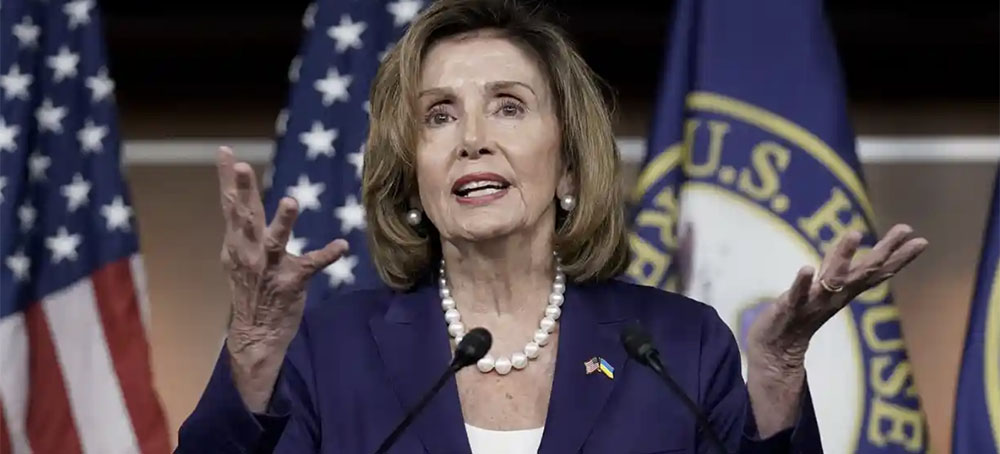 Nancy Pelosi began her tour of Asia at the weekend and may be arriving in Taipei on Tuesday. (photo: J Scott Applewhite/AP)
Nancy Pelosi began her tour of Asia at the weekend and may be arriving in Taipei on Tuesday. (photo: J Scott Applewhite/AP)
Spokesperson warns visit from US House speaker during Asia tour would have ‘egregious political impact’
The explicit message came amid reports that the US House speaker, who began her tour of Asia over the weekend, may be arriving in Taipei on Tuesday and as China’s People’s Liberation Army (PLA) was celebrating the 95th anniversary of its founding.
China’s spokesperson, Zhao Lijian, said that because of Pelosi’s status as the “No 3 official of the US government”, a visit to Taiwan, which China claims as its own province, would “lead to egregious political impact”.
The potential Taiwan leg of Pelosi’s tour is not yet in her public schedule. If she proceeds with the visit, it will be the first for a US House speaker in 25 years. In 1997, when the then speaker, Newt Gingrich, visited, Beijing protested against the trip but eventually swallowed its irritation.
Officially, Pelosi will only visit Singapore, Malaysia, South Korea and Japan on this trip. But Michael McCaul, Texas Republican and senior member of the House foreign affairs committee, and Democrat Anna Eshoo told US media last week that Pelosi had invited them to Taiwan. Both declined due to a scheduling conflict.
Pelosi’s trip comes at a time of extreme geopolitical uncertainty in the region. On Monday, she and a six-member congressional delegation held talks with Singapore’s prime minister, Lee Hsien Loong. The Singaporean leader “highlighted the importance of stable US-China relations for regional peace and security”, according to an official statement from Lee’s office.
In the run-up to Monday’s PLA founding anniversary, the Chinese military conducted “live-fire exercises” near the Pingtan islands off Fujian province, according to the official Xinhua news agency on Saturday. The Maritime Safety Administration warned ships to avoid the area.
Since reports of Pelosi’s potential Taiwan trip emerged a fortnight ago, Beijing’s state media outlets have intensified their criticism of US policy on Taiwan. In the last few days, Chinese diplomats have also repeated China’s stance, reiterating Beijing’s “one China principle”, on social media.
In Taiwan, speculation over Pelosi’s potential visit has been rife, with some sources suggesting she would land in Taipei on Tuesday and stay overnight. Taiwan’s government has not publicly commented on the reports.
Sign up to First Edition, our free daily newsletter – every weekday morning at 7am BST
George Yin, a distinguished fellow at the Center for China Studies at National Taiwan University in Taipei, said the US faced a strategic dilemma when it came to stabilising the Taiwan strait.
“On the one hand, the US needs to signal its support for Taiwan, particularly since China often portrays the US as a paper tiger who does not have the resolve to come to Taiwan’s aid,” Yin said.
“On the other hand, the US needs to reassure China that it still abides by the one China principle. Pelosi’s expected visit illustrates how difficult it is to strike a good strategic balance.”
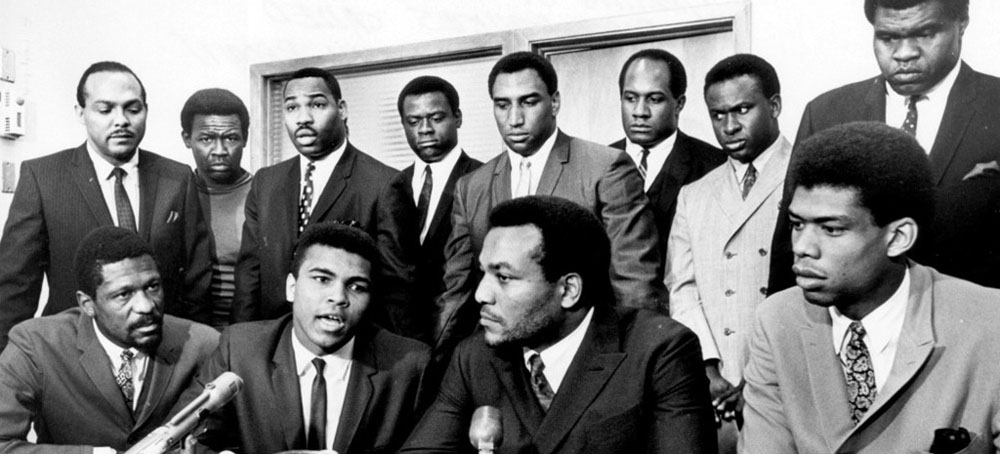 The Cleveland Summit, Cleveland, OH June 4, 1967. Seated front row from left to right, Bill Russell, Muhammad Ali, Jim Brown, Lew Alcindor; (back row) Carl Stokes, Walter Beach, Bobby Mitchell, Sid Williams, Curtis McClinton, Willie Davis, Jim Shorter, and John Wooten. (photo: Tony Tomsic/Getty Images)
The Cleveland Summit, Cleveland, OH June 4, 1967. Seated front row from left to right, Bill Russell, Muhammad Ali, Jim Brown, Lew Alcindor; (back row) Carl Stokes, Walter Beach, Bobby Mitchell, Sid Williams, Curtis McClinton, Willie Davis, Jim Shorter, and John Wooten. (photo: Tony Tomsic/Getty Images)
The most prolific winner in NBA history, Russell marched with Martin Luther King Jr., stood with Muhammad Ali and received the Presidential Medal of Freedom from President Barack Obama. The centerpiece of the Boston Celtics dynasty that won 11 championships in 13 years, Russell earned his last two NBA titles as a player-coach — the first Black coach in any major U.S. sport.
Russell died Sunday at the age of 88, with his wife, Jeannine, at his side, his family said in a statement posted on social media. No cause of death was immediately available; Russell, who had been living in the Seattle area, was not well enough to present the NBA Finals MVP trophy in June due to a long illness.
“We hope each of us can find a new way to act or speak up with Bill’s uncompromising, dignified and always constructive commitment to principle,” the family said. “That would be one last, and lasting, win for our beloved #6.”
A Hall of Famer, five-time Most Valuable Player and 12-time All-Star, Russell in 1980 was voted the greatest player in the NBA history by basketball writers. He remains the sport’s most decorated champion — he also won two college titles and an Olympic gold medal — and an archetype of selflessness who won with defense and rebounding while others racked up gaudy scoring totals.
Often, that meant Wilt Chamberlain, the only worthy rival of Russell’s era and his prime competition for rebounds, MVP trophies and barroom arguments about who was better. Chamberlain, who died in 1999 at 63, had twice as many points, four MVP trophies of his own and is the only person in league history to grab more rebounds than Russell — 23,924 to 21,620.
But Russell dominated in the only stat he cared about: 11 championships to two.
“Bill Russell was the greatest champion in all of team sports,” NBA Commissioner Adam Silver said. More importantly, he added: “Bill stood for something much bigger than sports: the values of equality, respect and inclusion that he stamped into the DNA of our league.”
In a statement released by the White House, President Joe Biden praised Russell for his lifelong work in civil right as well as in sports, and called him “a towering champion for freedom, equality, and justice.”
“Bill Russell is one of the greatest athletes in our history – an all-time champion of champions, and a good man and great American who did everything he could to deliver the promise of America for all Americans,” Biden said.
Reaction poured in Sunday, from Obama to Michael Jordan, from Magic Johnson to Boston’s Mayor, Michelle Wu.
“Today, we lost a giant,” Obama said. “As tall as Bill Russell stood, his legacy rises far higher — both as a player and as a person. Perhaps more than anyone else, Bill knew what it took to win and what it took to lead.”
A Louisiana native, Russell also left a lasting mark as a Black athlete in a city — and country — where race is often a flash point. He was at the March on Washington in 1963, when King gave his “I Have a Dream” speech, and he backed Ali when the boxer was pilloried for refusing induction into the military draft.
In 2011, Obama awarded Russell the Medal of Freedom alongside Congressman John Lewis, billionaire investor Warren Buffett, then-German Chancellor Angela Merkel and baseball great Stan Musial.
“To be the greatest champion in your sport, to revolutionize the way the game is played, and to be a societal leader all at once seems unthinkable,” the Celtics said on Sunday. “But that is who Bill Russell was.”
Russell said that when he was growing up in the segregated South and later California his parents instilled in him the calm confidence that allowed him to brush off racist taunts.
“Years later, people asked me what I had to go through,” Russell said in 2008. “Unfortunately, or fortunately, I’ve never been through anything. From my first moment of being alive was the notion that my mother and father loved me.” It was Russell’s mother who would tell him to disregard comments from those who might see him playing in the yard.
“Whatever they say, good or bad, they don’t know you,” he recalled her saying. “They’re wrestling with their own demons.”
But it was Jackie Robinson who gave Russell a road map for dealing with racism in his sport: “Jackie was a hero to us. He always conducted himself as a man. He showed me the way to be a man in professional sports.”
The feeling was mutual, Russell learned, when Robinson’s widow, Rachel, called and asked him to be a pallbearer at her husband’s funeral in 1972.
“She hung the phone up and I asked myself, ‘How do you get to be a hero to Jackie Robinson?’” Russell said. “I was so flattered.”
William Felton Russell was born on Feb. 12, 1934, in Monroe, Louisiana. He was a child when his family moved to the West Coast, and he went to high school in Oakland, California, and then the University of San Francisco. He led the Dons to NCAA championships in 1955 and 1956 and won a gold medal in 1956 at the Melbourne Olympics in Australia.
Celtics coach and general manager Red Auerbach so coveted Russell that he worked out a trade with the St. Louis Hawks for the second pick in the draft. He promised the Rochester Royals, who owned the No. 1 pick, a lucrative visit by the Ice Capades, which were also run by Celtics owner Walter Brown.
Still, Russell arrived in Boston to complaints that he wasn’t that good. “People said it was a wasted draft choice, wasted money,” he recalled. “They said, ‘He’s no good. All he can do is block shots and rebound.’ And Red said, ‘That’s enough.’”
The Celtics also picked up Tommy Heinsohn and K.C. Jones, Russell’s college teammate, in the same draft. Although Russell joined the team late because he was leading the U.S. to the Olympic gold, Boston finished the regular season with the league’s best record.
The Celtics won the NBA championship — their first of 17 — in a double-overtime seventh game against Bob Pettit’s St. Louis Hawks. Russell won his first MVP award the next season, but the Hawks won the title in a finals rematch. The Celtics won it all again in 1959, starting an unprecedented string of eight consecutive NBA crowns.
A 6-foot-10 center, Russell never averaged more than 18.9 points during his 13 seasons, each year producing more rebounds than points. For 10 seasons he averaged more than 20 rebounds. He once had 51 rebounds in a game; Chamberlain holds the record with 55.
Auerbach retired after winning the 1966 title, and Russell became the player-coach — the first Black head coach in NBA history, and almost a decade before Frank Robinson took over Cleveland in baseball’s American League. Boston’s title streak ended with a loss to Chamberlain and the Philadelphia 76ers in the Eastern Division finals.
Russell led the Celtics back to titles in 1968 and ’69, each time winning seven-game playoff series against Chamberlain. Russell retired after the ’69 finals, returning for a relatively successful — but unfulfilling — four-year stint as coach and GM of the Seattle SuperSonics and a less fruitful half season as coach of the Sacramento Kings.
Russell’s No. 6 jersey was retired by the Celtics in 1972. He earned spots on the NBA’s 25th anniversary all-time team in 1970, 35th anniversary team in 1980 and 75th anniversary team. In 1996, he was hailed as one of the NBA’s 50 greatest players.
In 2009, the MVP trophy of the NBA Finals was named in his honor. (Russell never won the honor, because it was awarded for the first time in 1969.) He presented his namesake trophy for many years, the last in 2019 to Kawhi Leonard; Russell was not there in 2020 because of the NBA bubble nor in 2021 due to COVID-19 concerns.
In 2013, a statue was unveiled on Boston’s City Hall Plaza of Russell surrounded by blocks of granite with quotes on leadership and character. Russell was inducted into the Basketball Hall of Fame in 1975 but did not attend the ceremony, saying he should not have been the first African American elected. (Chuck Cooper, the NBA’s first Black player, was his choice.)
In 2019, Russell accepted his Hall of Fame ring in a private gathering.
“I felt others before me should have had that honor,” he tweeted. “Good to see progress.”
But to Jordan, Russell stood alone.
“Bill Russell was a pioneer — as a player, as a champion, as the NBA’s first Black head coach and as an activist,” the former Chicago Bulls star and current Charlotte Hornets majority owner said. “He paved the way and set an example for every Black player who came into the league after him, including me. The world has lost a legend.”
Russell’s family said arrangements for the memorial service will be announced in the coming days.
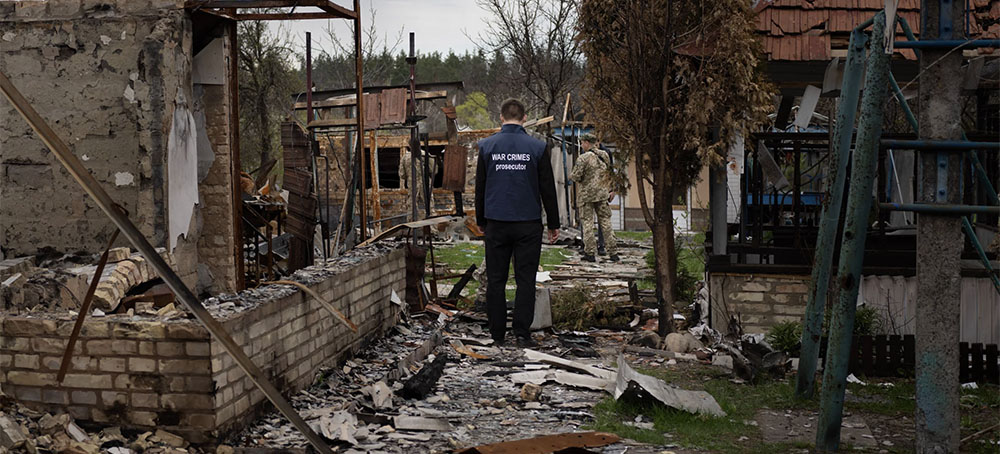 Pavlo Rebenko, a Ukrainian war crimes prosecutor, enters the rubble around a house to look at a human skeleton in Moshchun, Ukraine. (photo: Claire Harbage/NPR)
Pavlo Rebenko, a Ukrainian war crimes prosecutor, enters the rubble around a house to look at a human skeleton in Moshchun, Ukraine. (photo: Claire Harbage/NPR)
In the occupied part of the Luhansk region, there is a humanitarian catastrophe because the occupiers are not burying the bodies of the deceased and leave them in the streets.
Source: Serhii Haidai, head of the Luhansk Oblast Military Administration, in the joint national 24/7 newscast
Quote: "The humanitarian situation in the region is catastrophic. Bodies of both military personnel and civilians are being left in the streets.
Some medical staff have arrived in Sievierodonetsk from Russia, but there is no clear information about this at the moment. People are wearing protective suits in the hospital because a very severe infection has broken out.
If people drink water from wells, they quickly contract infections. This is because the bodies of the deceased have not been taken off the streets, and decaying bodies seep into the water".
Details: In the occupied part of Luhansk Oblast, punitive measures are being taken against people who are pro-Ukrainian, Ukrainian literature is being destroyed.
Part of Luhansk Oblast remains under Ukrainian control, and the Ukrainian forces are strongly holding the line.
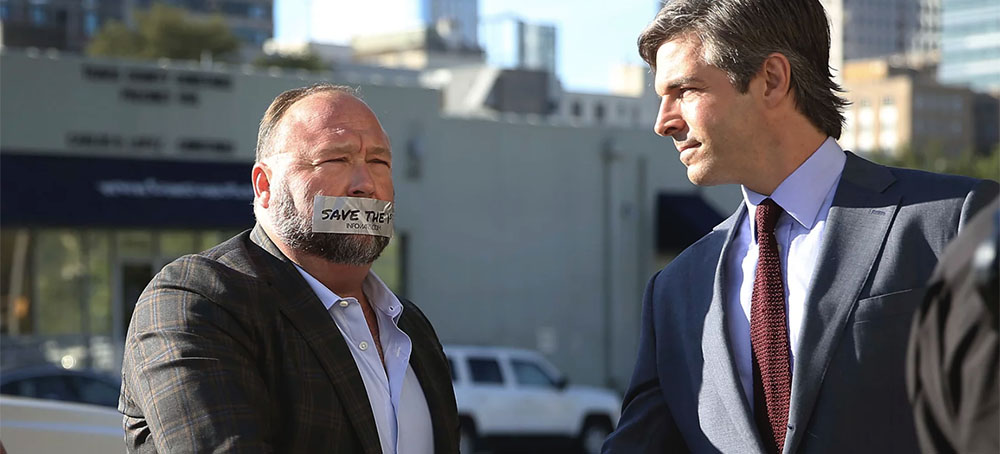 Alex Jones arrives at the Travis County Courthouse in Austin, Texas, on July 26, 2022, with a piece of tape over his mouth that reads 'save the 1st.' (photo: Briana Sanchez/Austin American-Statesman/AP)
Alex Jones arrives at the Travis County Courthouse in Austin, Texas, on July 26, 2022, with a piece of tape over his mouth that reads 'save the 1st.' (photo: Briana Sanchez/Austin American-Statesman/AP)
The trial in Austin, where Jones lives and Free Speech Systems is based, wrapped up its first week of testimony Friday and is expected to conclude next week. The bankruptcy filing was announced by Jones' attorney Andino Reynal late in the day.
Reynal and attorneys for the family suing Jones told Judge Maya Guerra Gamble that the bankruptcy filing would not halt the lawsuit.
The company wants "to put this part of the odyssey behind us so that we have some numbers" set for damages, Reynal said.
Details of the bankruptcy filing were not immediately available.
It is not the first time a bankruptcy filing has come amid litigation against Jones by the Sandy Hook families. In April, Jones' company Infowars and two more of his business entities filed for bankruptcy protection, which led to a trial delay. Free Speech Systems is the parent company of Infowars.
Courts in Texas and Connecticut have already found Jones liable for defamation for his portrayal of the Sandy Hook massacre as a hoax involving actors aimed at increasing gun control. In both states, judges issued default judgements against Jones without trials because he failed to respond to court orders and turn over documents.
Christopher Mattei, an attorney for the Sandy Hook families in the Connecticut case, issued a statement Friday evening blasting the bankruptcy filing.
"Just two days before jury selection is due to begin in Connecticut, Mr. Jones has once again fled like a coward to bankruptcy court in a transparent attempt to delay facing the families that he has spent years hurting," Mattei said. "These families have an endless well of patience and remain determined to hold Mr. Jones accountable in a Connecticut court."
The trial in Austin is to determine how much Jones should pay for defaming Neil Heslin and Scarlett Lewis, whose 6-year-old son, Jesse Lewis, was among the 20 children and six educators who were killed in the country's deadliest school shooting. They and other Sandy Hook families suing Jones say they have suffered years of harassment and threats resulting from Jones' repeated false claims that the shooting was a hoax or didn't happen.
Jones claimed in court records last year that he had a negative net worth of $20 million, but attorneys for Sandy Hook families have painted a different financial picture.
Court records show that Jones' Infowars store, which sells nutritional supplements and survival gear, made more than $165 million between 2015 and 2018. Jones has also urged listeners on his Infowars program to donate money.
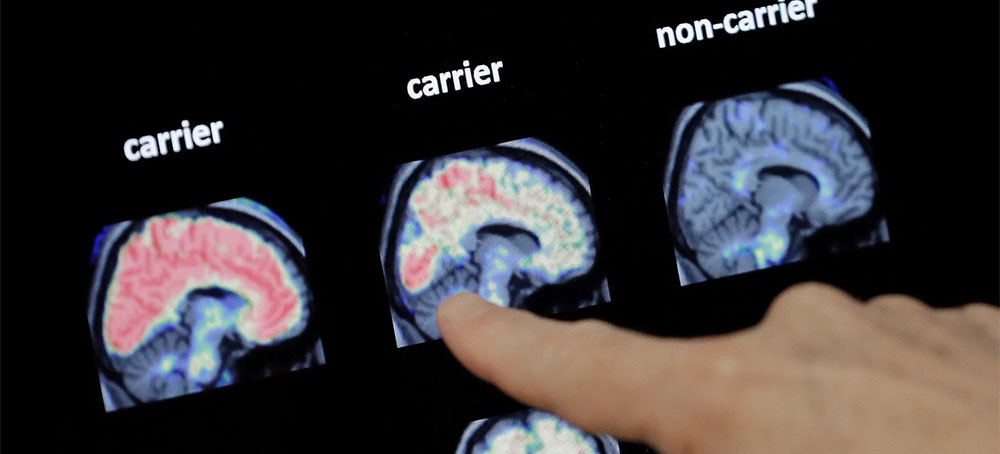 Scientists say research into Alzheimer's needs to take a broader view of how the disease affects the brain — whether that's changes in the cortex or the role of inflammation. (photo: Matt York/AP)
Scientists say research into Alzheimer's needs to take a broader view of how the disease affects the brain — whether that's changes in the cortex or the role of inflammation. (photo: Matt York/AP)
After decades of focusing on the sticky amyloid plaques and tangled tau fibers associated with the disease, brain researchers are searching for other potential causes of impaired memory and thinking.
That search is on full display this week at the Alzheimer's Association International Conference in San Diego, where sessions are exploring factors including genes, brain injury, clogged arteries and inflammation.
A group of researchers from Seattle even unveiled a highly detailed atlas showing how different types of brain cells change in Alzheimer's. The goal is to help scientists identify new approaches to treatment.
"Certainly, plaques and tangles are a hallmark," says Maria Carrillo, chief science officer of the Alzheimer's Association. "It doesn't mean plaques are the cause of cell death."
Plaques are clumps of a protein called beta-amyloid that appear in the spaces between neurons. Tangles are made up of a protein called tau that appears inside a neuron.
Both proteins tend to accumulate in the brains of people with Alzheimer's. But their role in killing brain cells is still unclear.
Carrillo says the Alzheimer's field needs to look to cancer research where a deeper understanding of the disease has led to better treatments.
The shift comes after a series of experimental drugs have succeeded in removing amyloid plaques and tau tangles from the brain, but failed to halt the disease.
The Food and Drug Administration has approved one amyloid drug, Aduhelm, but is still evaluating whether it actually helps patients.
An Alzheimer's Atlas
The study that produced the atlas is emblematic of how researchers are recalibrating.
"What we're trying to do with this study is to look at cell vulnerability early on in disease, before [people] have plaques and tangles, before they have cognitive impairment," says Dr. C. Dirk Keene, a neuropathologist at the University of Washington.
To create the atlas, Keene and a team of researches analyzed more than a million cells from 84 brains donated by people who'd signed up for Alzheimer's research projects run by the University of Washington and Kaiser Permanente Washington Research Institute.
The brains came from donors "at all different stages of disease" Keene says, "so we can pinpoint what's happening from the earliest levels all the way through to people with advanced disease."
The effort is funded by the National Institute on Aging and grew out of the federal BRAIN initiative launched by President Obama in 2013.
The atlas came from the realization that "If we want to treat diseases of an extremely complex cellular organ, you need to understand that organ much better than we do," says Ed Lein, a senior investigator at the Allen Institute for Brain Science, which played a key role in analyzing the brain tissue.
So the team spent years studying cells in healthy brains before looking at brains affected by Alzheimer's.
"We've defined what a normal adult brain looks like," Lein says, "and now we can use that knowledge and look for changes that are happening in specific kinds of cells."
Finding vulnerable brain cells
At the Alzheimer's meeting, the team described changes they saw in more than 100 types of cells taken from the cortex — an area of the brain which is important to memory and thinking.
One finding was that neurons that make connections within the cortex itself were much more likely to die than those that connect to distant areas of the brain.
"What we're seeing is a profound effect on cortical circuitry that very plausibly is the reason we have cognitive decline," Lein says.
If so, a treatment designed to protect those vulnerable neurons might prevent declines in memory and thinking linked to Alzheimer's.
The team also found a proliferation of brain cells that contribute to inflammation. These included certain immune cells and a type of cell that responds to injury.
"So while the neurons are lost, the non-neuronal cells are actually increasing and changing" Lein says.
The finding supports the idea that inflammation plays an important role in Alzheimer's, and that anti-inflammatory drugs might help protect the brain.
The Seattle team hopes other scientists will use the brain cell atlas to come up with new treatments for Alzheimer's.
"We've created an open-access resource where the whole community can come and look at this data," Lein says. "They can mine it to speed up progress in the field as a whole."
Speeding up progress is one reason Kyle Travaglini, a researcher at the Allen Institute, jumped at the chance to work on the Alzheimer's project.
"My grandmother started developing Alzheimer's disease when I was just going off to college," says Travaglini, who received his PhD in 2021.
Travaglini says the atlas project is appealing because it isn't based on a preconceived idea about what causes Alzheimer's.
"It's like looking at the same disease that everyone has been looking at but in an entirely different way," he says.
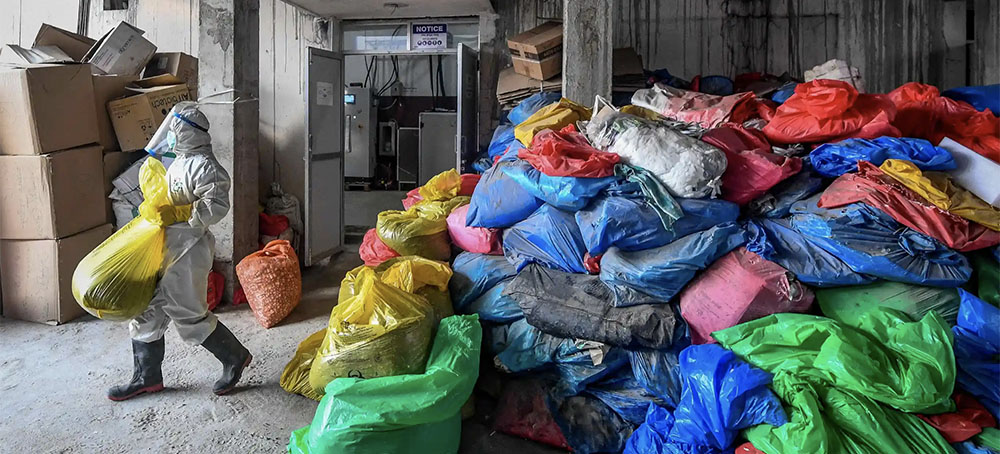 A worker at a hospital in Kathmandu, Nepal, readies bags of Covid-19 waste for treatment, December last year. (photo: Prakash Mathema/AFP/Getty Images)
A worker at a hospital in Kathmandu, Nepal, readies bags of Covid-19 waste for treatment, December last year. (photo: Prakash Mathema/AFP/Getty Images)
With its products proving indispensable to combatting Covid-19, the plastics business is reinvigorated. What will it take to bring this major polluter to heel?
In the two years leading up to the pandemic, the public backlash against plastic was a major concern for industry leaders. As a corporate executive remarked during an industry event early in 2019: “We need to get the image of plastic in oceans out of the public’s mind. Otherwise, we could lose our social licence to operate.” Of course, the pandemic did not take the image of plastic in oceans out of the public’s mind. However, it did highlight in a very real and urgent way the importance of many plastic products for healthcare and hygiene. At the virtual World Petrochemical Conference in April 2020, an industry analyst commented on this unexpected shift: “Ironically, sustainability, the issue that was dominating the conversation until just a few weeks ago, seems to be fading into the background, at least for the moment. And polyethylene may even be gaining some public favour as it plays a high-profile role in combating the greatest health risk to our planet in modern history.”
This temporary respite from public anti-plastic sentiment opened the door for industry to push back against single-use plastics bans. In July last year, the European Commission rejected the industry’s request to delay the EU Directive on Single-Use Plastics. However, multiple single-use plastics bans and deposit return schemes were reversed or delayed in countries around the world, across North America, Europe, Africa, and Asia.
During the pandemic, plastic was restored to its original paradoxical status as both a miracle and a menace for society. As far as industry was concerned, this was enough: it had regained its social licence to operate. By the end of 2020, industry leaders had fully embraced the new pandemic narrative about the essential role of plastics in society and many expressed optimism about their future growth. At the virtual World Petrochemical Conference in March 2021, industry analysts identified four key “Covid demand drivers”: food packaging, bag ban delays, online shopping, and hygiene and medical.
As one petrochemical industry executive enthused: “The Covid-19 pandemic highlighted how essential all our products are to everyone in society around the globe. We saw record sales and record volumes for our products throughout the pandemic… over the long term we can continue to see that kind of growth, and we’re going to see that accelerate as economies reopen around the world. All of this is really driven by the world’s growing global middle class, and that’s going to drive demand for the products we produce. Covid-19 didn’t change our long-term view on the fundamentals.”
Hearing these glowing industry reports about single-use plastics growth, I couldn’t help feeling guilty about the plastics that have entered my home in the UK during the pandemic. Many environmental activists and researchers have pointed out that one of the key tactics of industry is to blame the consumer for plastic waste, which diverts attention from corporate responsibility. The plastics crisis is a systemic problem, however, and most people are locked into supply chains and infrastructures, unable to simply opt out of plastics consumption.
According to a recent study published in the journal Science Advances, the United Kingdom is second only to the United States in terms of the amount of plastic waste generated per person, at 99kg and 105kg per person per year respectively. Supermarkets with over-packaged food are one of the main problems. By contrast, the global average of plastic consumption is 45kg per person per year, and as little as 4kg per person per year in India. Looking at the consequences of one’s own actions, from a privileged standpoint, multiplied and intensified across the planet, invites a kind of vertigo.
While voluntary corporate commitments to end plastic waste have flooded in, the plastics crisis has kept getting worse. Some of the most scathing reports have emerged during the pandemic, such as the Changing Markets Foundation’s report Talking Trash, which concluded that “the Covid-19 health crisis has, once again, shown that Big Plastic is always primed and ready to co-opt a crisis to its advantage, pushing to undermine environmental legislation or any restrictions on its products… [T]he plastics industry does not have people’s best interests at heart; instead, it is making cold calculations to carry on with business as usual.” The Talking Trash report focused on the inadequate voluntary commitments of the top plastics polluters in the consumer goods and beverage industries, and the corporate “playbook” for undermining plastics legislation, particularly deposit-return schemes and single-use plastic bans.
One important lever for changing the plastics industry has gained traction during the pandemic: the dawning realisation by many investors and policymakers that green recovery paths to net zero will need to phase out fossil fuels altogether, including virgin (brand new) plastic. In September 2020, the thinktank Carbon Tracker warned investors in plastics about the risk of holding stranded assets in the transition away from fossil fuels. Plastic is the last pillar of oil demand growth, its researchers argued, but this pillar would be removed very soon by increasing regulatory and recycling pressures, accelerated by green recovery packages.
The need to reduce the reliance of plastics on fossil fuels has also featured in a number of policy proposals, dovetailing with the momentum to respond to the climate emergency through green recoveries after the pandemic. The US Break Free from Plastic bill re-emerged early in 2021 under the Biden presidency, incorporating calls from environmental activists and frontline communities to halt petrochemical projects and to hold corporations accountable for waste and emissions throughout the plastic life cycle. Plastics sustainability, incorporating net zero emissions targets, is also a prominent part of the European Green Deal. Furthermore, reducing virgin plastic production is a core (if contested) topic for debates about the scope of a new UN treaty on plastics, amid growing recognition from many governments, organisations and researchers that the problem of plastic pollution extends through the plastics life cycle, from the extraction of raw materials through to manufacturing, consumption, waste and pollution.
If there is any insight that can be gained from looking at the ways corporations have responded to the plastics crisis, which has magnified during the pandemic, it is the power of legislation. Binding laws and regulations offer less room for manoeuvre than voluntary commitments, especially when it comes to bans. The plastics industry is more concerned about the threat of the European Single-Use Plastics Directive, which is binding legislation, than the Ellen MacArthur New Plastics Economy Global Commitment, which is based on voluntary circular economy commitments. Outright bans of specific plastic products, on the grounds of protecting the environment or public health, effectively take these products off the market.
The pandemic has made clear that we need legislation and binding regulations to address the plastics crisis, but we also need another lever of change. We need to keep questioning the dominant assumption that there can be continual plastics growth on a finite planet. If this assumption could be overturned, aligning with the growing consensus that the world needs to transition away from fossil fuels, that would be a starting point for meaningful change.
Follow us on facebook and twitter!
PO Box 2043 / Citrus Heights, CA 95611


No comments:
Post a Comment
Note: Only a member of this blog may post a comment.